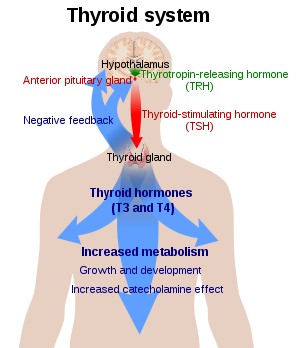ENDOCRINE GLAND
Adrenal gland
The adrenal glands (also known as suprarenal glands) are endocrine glands that produce a variety of hormones including adrenaline.
They are found above the kidneys.
Hypothalamus
The hypothalamus is a portion of the brain that contains a number of small nuclei with a variety of functions.
One of the most important functions of the hypothalamus is to link the nervous system to the endocrine system via the pituitary gland.
Pituitary gland
It is an endocrine gland about the size of a pea and weighing 0.5 grams in humans.
Hormones secreted from the pituitary gland help control:
- growth,
- blood pressure,
- certain functions of the sex organs,
- metabolism,
- pregnancy,
- childbirth,
- nursing,
- water/salt concentration,
- temperature regulation
- pain relief.
Thyroid
The thyroid gland, or simply the thyroid is one of the largest endocrine glands in the body.
 It is found in the interior neck, below the Adam's apple.
It is found in the interior neck, below the Adam's apple.It controls
- rate of use of energy sources,
- protein synthesis,
- controls the body's sensitivity to other hormones.
Pancreas
The pancreas is a glandular organ in the digestive system and endocrine system of vertebrates.
In humans, it is located in the abdominal cavity behind the stomach.
It produce several important hormones
- including insulin,
- glucagon,
- somatostatin, and
- pancreatic polypeptide which circulate in the blood.
The pancreas is also a digestive organ, secreting pancreatic juice containing digestive enzymes that assist digestion and absorption of nutrients in the small intestine. These enzymes help to further break down the carbohydrates, proteins, and lipids in the chyme.

Post a Comment
Post a Comment